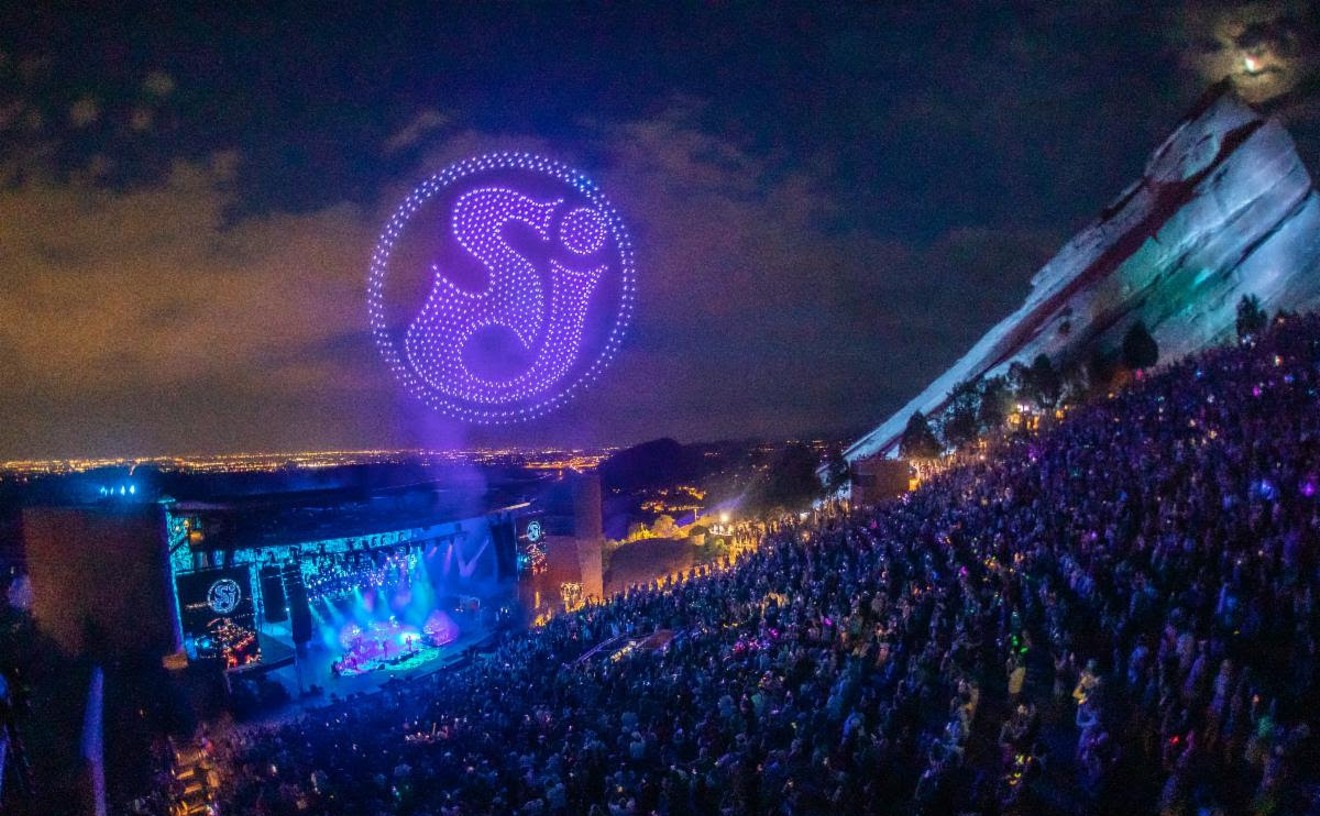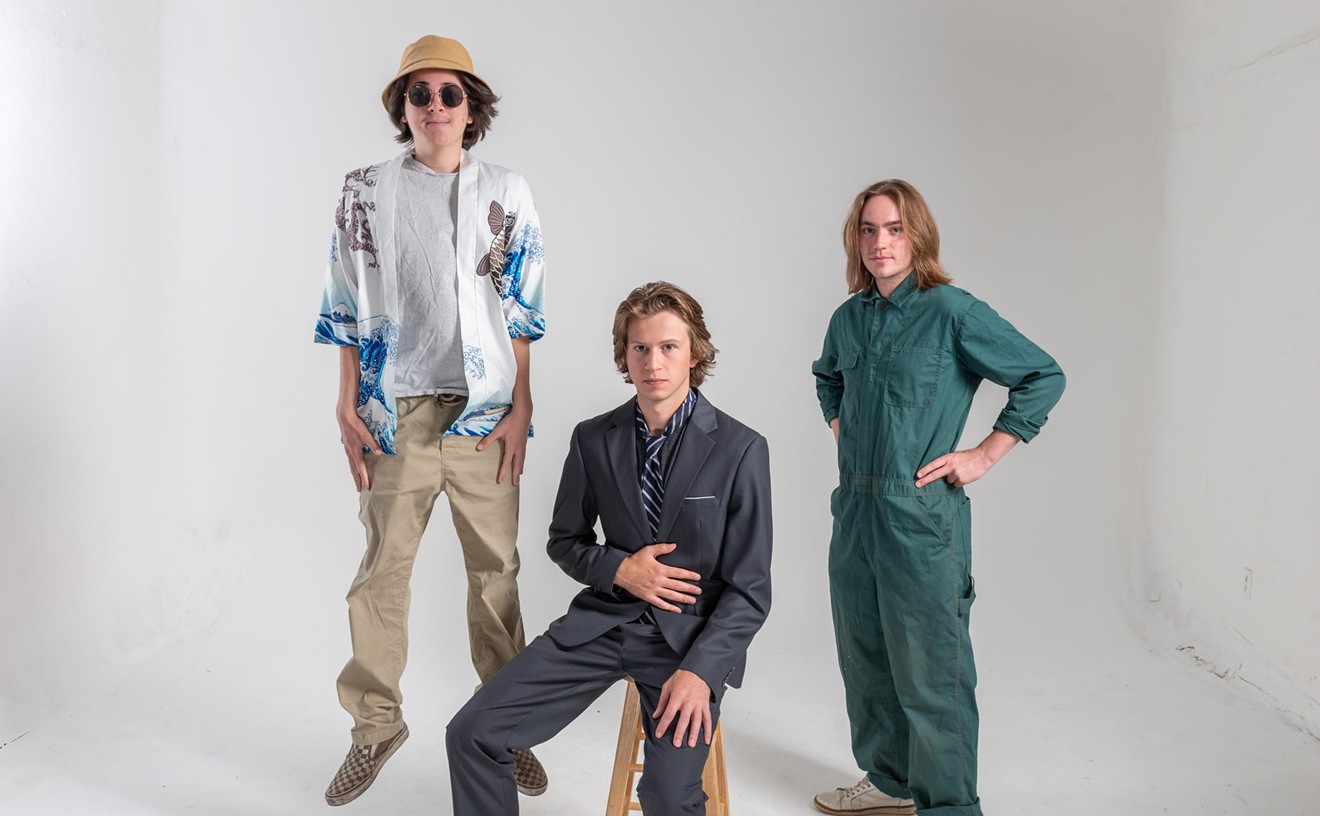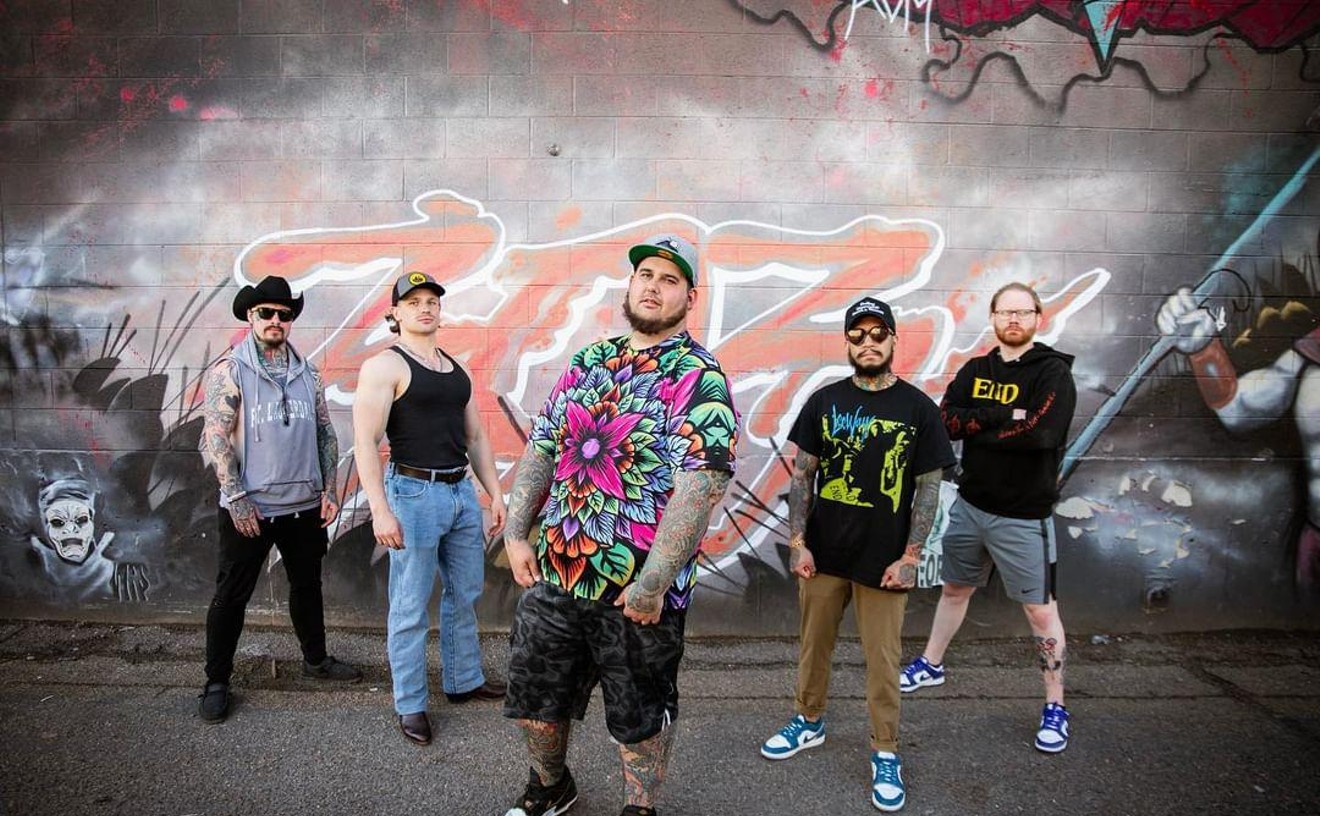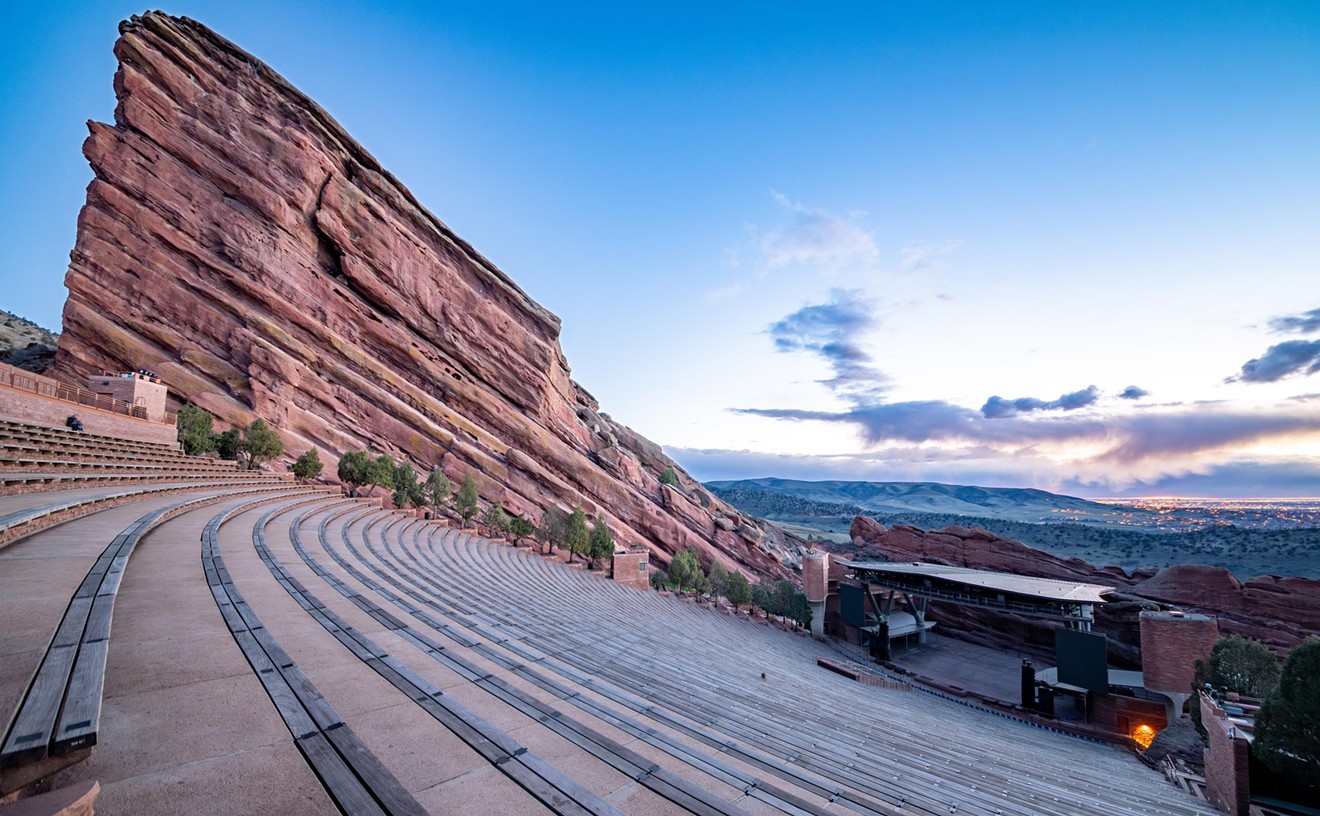Rob Swire, a singer, producer and multi-instrumentalist for Pendulum, has done a lot of moving around, both musically and physically. The band got started in his native Australia before relocating to England -- and now Swire and company are hoping to conquer the United States with a sound that's transitioned from straight-forward drum-and-bass to a rock-electro hybrid that's proving to be simultaneously popular and controversial, as he confirms in the following Q&A for an October 9 Westword profile.
Swire talks about his upbringing in Perth, Australia; his eventual entry into the city's dance scene, where he met and connected with future Pendulum mates Gareth McGrillen and Paul "El Hornet" Harding; their subsequent decision to head to the U.K., in part because their music was earning more acceptance there than in their homeland; the irony of returning to Perth as conquering heroes; the recording of their first album, Hold Your Colour, and a remixing gig for the Prodigy; the gradual addition of rock elements, inspired in part by Swire's increasingly heavy listening habits; the reaction to In Silico, their 2008 long-player, which has tended to divide older fans from newer ones in unexpected ways; the meanings behind two In Silico tracks, "The Other Side" and "Granite"; and his hope that Americans prove as suceptible to the new Pendulum sound as the Brits have been.
There's one way to find out.
Westword (Michael Roberts): Most of the articles about you guys are pretty short on biographical information, so I was hoping you could help fill in the gaps. You’re originally from Perth?
Rob Swire:Yeah. Perth, Australia.
WW: For those of us in the States, how would you describe the city?
RS: I can’t really relate the size of it to an American city off the top of my head. It’s about the same size as Adelaide or one of the other Australian cities. It’s a pretty small town and it goes at a pretty small pace.
WW: Tell me about your parents. And do you have any siblings?
RS: I’ve got one sister. And my parents were born in South Africa.
WW: When did they emigrate to Australia?
RS: I think about a year before I was born. And then we went back – we actually lived in Zimbabwe for about five years.
WW: What do they do for a living?
RS: My dad’s a business consultant, and my mom does social work.
WW: Are they musicians in their free time? Or do they at least have a fondness for music?
RS: I think my dad would like to be a musician (laughs). He sort of buys instruments and leaves them in the back of the room.
WW: Is that how you got started in music? You picked up some of the instruments he brought home but didn’t do anything with?
RS: That’s definitely how it went with guitar. Definitely.
WW: How old were you when you first started playing.
RS: I can’t even remember, it was so long ago.
WW: Really young?
RS: Yeah.
WW: When did you first get involved with the club scene in Perth?
RS: Not until much later. Probably even after we got into dance music. I didn’t start going to a lot of the drum-and-bass events until we left school, which was in the end of 1999.
WW: Was there a pretty active drum-and-bass community there?
RS: Yeah, it was really good around there. Around the time we started taking off in 2002, 2003, there were at least three clubs dedicated to playing drum-and-bass every week.
WW: Was it a scene where everyone knew everyone else? And everyone collaborated together?
RS: Yeah. Pretty much. It was pretty tight-knit like that.
WW: At what point did you start writing your own songs, as opposed to spinning or remixing ones by other artists?
RS: For me, it actually happened the other way. I’ve been producing my music for quite a while, and I only started learning to DJ once Pendulum started taking off in Perth.
WW: What other artists did you work with? Were they mostly local artists from the scene?
RS: Yeah, mostly local artists. A few doing diva-ish vocal tracks over a couple of tunes. And then there was one I did the vocals on.
WW: How did you meet Gareth and Paul?
RS: I’d known Gareth for quite a while. He went to high school with me and we’d been mates. And Paul, he was quite well known in the drum-and-bass club scene down in Perth.
WW: What were the advantages of teaming up as opposed to working independently?
RS: Originally, for us, the advantage was that he could DJ and we didn’t know how (laughs). We could make a track and he could take it down to the club and spin it for a room full of people, with us sort of standing on the side of the stage, listening. But as time went on, we all learned how to make music, and we all sort of learned how to DJ. People kind of crossed over.
WW: In the beginning, was the music you made very much in the drum-and-bass mode. Or were you thinking about ways to broaden your audience from early on?
RS: No, it was pretty firmly in the drum-and-bass genre. We were really just trying to get people from the drum-and-bass scene in the U.K., DJs, to play our tracks.
WW: Was your move to the U.K. precipitated by the idea that if you were actually there, it would help you get their attention?
RS: Yeah, definitely. Plus, in Perth, time seems to slow down a bit and you don’t really hear about any new tracks until a year later. We thought, London seems to be the home of drum-and-bass. We’ll move there and try to see how it goes.
WW: Was there also a sense that you’d already conquered Perth, or at least that you’d gotten everything out of the city that you could, and you were looking for new challenges?
RS: I’d like to think so, but as I remember, back in Perth, we were actually having quite a bit of trouble even as we were having records released on quite big drum-and-bass labels back in the U.K. We were having trouble attracting audiences down in Perth. That made us glad to leave when we did. We found out once we’d been in the U.K. for a while and then we came back home, the crowds came out to see us then (laughs).
WW: Do you have a guess as to why you were having problems back home? Were you trying to push your sound forward more quickly than people in Perth were able to understand? Were you a little ahead of the curve?
RS: I don’t know. Especially in the drum-and-bass scene back then, there was always a big thing about U.K. artists coming over, or U.S. artists. If they were from a different country, people would go out and see them. If they were from Perth, they wouldn’t bother. But I think the fact that we’d moved to the U.K. and had a successful go of it there kind of helped us.
WW: Was it as if you’d been validated?
RS: Yeah. Exactly.
WW: In the U.K., were you greeted with open arms right away? Or did it take a while for you to establish your reputation?
RS: It was surprisingly quick, actually. We’d always thought of drum-and-bass as an insular, old-boys club full of the DJs who’d started the scene having a stranglehold on it. But I don’t know: The more we stuck around, the more we were accepted. And after about a year, no one even thought about it.
WW: How did the opportunity to record your first album come along?
RS: That happened once we signed to our first small label, Breakbeat Kaos. They said, “We’d like you guys to put an album together.” And I think we were a bit thrown back, because we’d always liked the idea of just releasing singles and didn’t really know how we were going to go about putting an album together.
WW: What was your approach? Did you set out to make it a collection of singles? Or did you set out to establish an overall theme?
RS: I think it was a little bit of both. We said, “We’ll just make a bunch of tracks” – some with the big, heavy, dance-floor sound of the Pendulum things we’d made in the past. But also include some new tracks that we otherwise wouldn’t have been able to make if we hadn’t been putting them on an album. And the whole thing had to have a sound – our sound.
WW: Once you started recording, did you sort of get the album-making bug? Was it exciting and challenging in ways you might not have thought it would be?
RS: Yeah, definitely. I think it gave us a chance to go places we wouldn’t have gone if we’d just stuck to releasing singles. You get the idea of someone sitting down and listening to a full album and you start getting ideas about places you can take them.
WW: By releasing the album, did it open the doors for you guys to remix artists like the Prodigy? Did it put you on the map?
RS: It’s funny: The Prodigy remix, I think that happened even before Hold Your Colour got released. We’d just finished writing it and I think about two days later, our manager, Joe, called me up and said, “Rob, the Prodigy wants you to do a remix, and it’s got to be done in two days.” And I was like, “Oh, shit, I just finished an album’s worth of material. It’s not the first thing I feel like doing, working on another tune.” And there were two other drum-and-bass artists remixing it. But we’d already made a start on “Voodoo People” as it was, so we went ahead and finished it.
WW: That would have been a hard request to say “no” to, I imagine…
RS: You can’t say “no” to “Voodoo People.” And more than that, where we were at the time, you couldn’t say “no” to the Prodigy.
WW: In Silico, the new album, is a real departure from Hold Your Colour. But I understand you started recording it very shortly after finishing the first record. Is that right?
RS: Yeah, we started writing close to about three months after finishing the last one and kept on writing up until it was released.
WW: Did you consciously set out to embrace more rock elements? Or did that evolve as the process moved forward?
RS: I think it naturally evolved. We never really sat down and said, “This has got to involve more rock riffs.” I don’t know: We were listening to less and less drum-and-bass and listening to more and more Queens of the Stone Age and Tool and all of that kind of stuff. So I think it naturally crept in there.
WW: At what point, did you realize that you were heading in a very new direction, and although you might attract a lot of new fans, you might also piss off the ones you already had?
RS: I think there was a point where I had a bounce-down of all the tracks we’d written for In Silico, and it was the first time I had them all set out on the desktop ready to listen to as an album. I remember going to Gareth and our manager and saying, “This is album track number one, this is album track number two, this is album track number three – and this is drum-and-bass. I’m not going to allow this one.” And initially, I was a bit worried. But as time went on, I thought, a good track’s a good track – so fuck it.
WW: Did you find that a lot of your older fans were more open-minded than you thought they’d be? That even though the music was very different, they were still into what you were doing?
RS: I think so, yeah. I think a lot of our older fans understood the leap. And I found a lot of young fans who were new to drum-and-bass were the most pissed off with what we’d done. They tended to be people who were just like us: As soon as they got into the scene, they listened to nothing but drum-and-bass, and it sort of shut them off. To them, anything else sounded like shit.
WW: So the ones in the middle of that heavy obsession phase were behind the backlash?
RS: Exactly. And I understood that, because we’d been there. There was a point in time where I woke up and realized, “Shit, I’ve been listening to nothing but drum-and-bass for the past year, and sort of went down to the HMV, which is a music shop, and bought a bunch of other CDs.
WW: Do you remember any of those CDs?
RS: One of them was A Perfect Circle. One of their new albums had just been released. And another one was Chick Corea.
WW: That’s a wide variation…
RS: Yeah (laughs).
WW: I imagine that the success of In Silico has made it a lot easier for you to brush off the criticism that’s greeted the album…
RS: Yeah, exactly. It seemed like for every ten old drum-and-bass fans that were upset, thirty more people liked the new album. So that inspired us a bit.
WW: Have the new songs given you a lot more options in terms of performing them live?
RS: Definitely. As long as they’re energetic, and as long as they’ve got that sort of Pendulum sound, the new fans don’t really give a shit how much guitar they’ve got in them.
WW: There’s always a danger of reading too much into lyrics – but there are some on the new album that listeners may interpret as being you guys talking about yourselves. Like in “The Other Side,” where there’s all this talk about “saviors” and dragging people from where they are to where they belong. Was that any kind of a comment to fans – a way of saying they may not be sure about where you’re taking them, but they’ll like it when they get there?
RS: No, actually – although that’s quite close. It’s actually the closest so far. No, it was actually sort of a semi-jab at the whole major label experience.
WW: So were you guys the ones who felt you were being dragged somewhere?
RS: That’s what we were worried about initially. I think the song’s about that initial worry. But as it turned out, things have been good.
WW: Your experiences have been pretty positive so far?
RS: Yeah. I’d say I wasn’t that into the whole A&R process of the label coming into the studio. I don’t know if I’d really care to repeat that on the next one.
WW: Since the new album has done so well, do you think they’ll leave you alone next time around?
RS: I think so, yeah.
WW: What about the references in “Granite” to a “new way” and a “new dawn”? What was your focus there?
RS: This was around the time of Hurricane Katrina happened. There was all this shit in the world that was changing on such a massive scale, and it was the first time I’d ever seen an entire city flooded out. It was a sense of being invaded by something. It got into our head, that feeling.
WW: Here in the States, groups with electronics as a major part of their sound have often had a hard time getting beyond a cult-band status. Even the Prodigy ran into that. Do you think things are going to be different for you? And if so, do you think that might be because of the rock elements we were talking about earlier?
RS: I guess all we can do is hope so. I do hope that’s the case. There’s this whole thing over in the U.K. music industry about breaking America, and I don’t know – I’ve always found it to be a bit stupid because it’s not like we’re trying to appeal to an Egyptian audience. You guys are just people who like music, same as anywhere else.
WW: Given how you’ve done in England, does breaking America really matter that much to you? Or would it be very disappointing if you couldn’t get a foothold in the U.S.?
RS: I think it’d be a shame, because we’ve always made tracks on the principle that we hope anyone’s going to be into them. I guess if it didn’t happen, we’d have to have a look at why. But I’m interested to see how it goes down, especially when you look at the success of bands like MGMT. Hopefully it won’t be too difficult.











